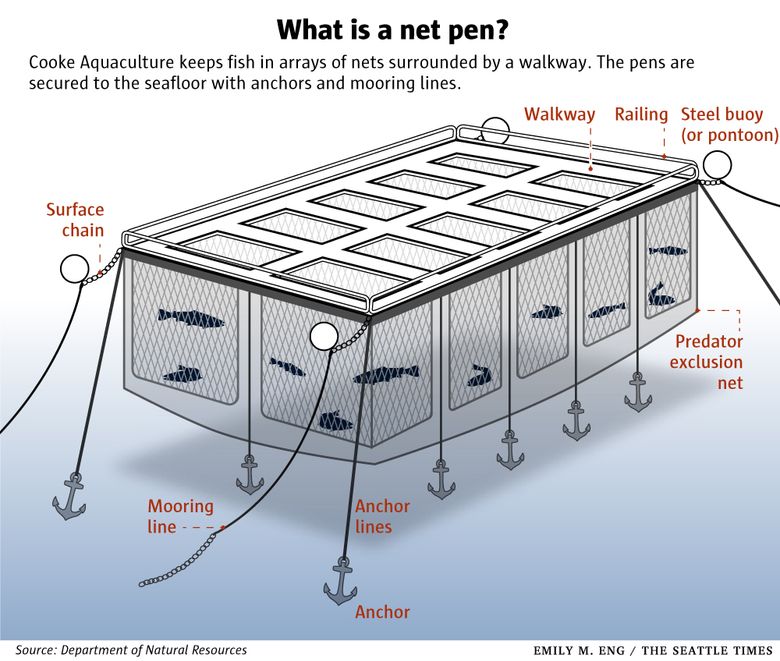Cooke Aquaculture has reached a settlement to pay $2.75 million in legal fees and to fund Puget Sound restoration projects, putting an end to a Clean Water Act lawsuit that followed the 2017 collapse of one of the fish-farming company’s net-pen structures.
The nonprofit Wild Fish Conservancy, an advocacy group that opposes fish farming in open water, initiated its lawsuit against Cooke in August 2017, about a week after a Cooke net pen near Cypress Island collapsed. State regulators would later say the company’s negligence led to the collapse and determined that as many as 263,000 Atlantic salmon escaped the floating cage structure and into Puget Sound. Fears did not materialize that the escaped salmon would survive and spread in Washington waters. Some were concerned they could be a threat to native salmon.
The legal settlement, which awaits federal officials’ review and a judge’s signature, bookends a contentious and litigious chapter in the fight over fish farming in Washington waters that resulted in the termination of some of Cooke’s leases, a $332,000 fine to Cooke from state regulators and a ban on farming nonnative fish like Atlantic salmon that state lawmakers passed last year. Meanwhile, Cooke seeks to open a new chapter with its recent proposal to farm native steelhead.
The settlement Wednesday follows a U.S. District judge’s ruling earlier in the week that Cooke had failed to inspect some mooring components at several of its fish farms, did not complete required inspection forms at some sites and did not properly track the number of fish in its net pens or report all escapes as recently as 2018.
About $1.6 million from the settlement is slated to pay the Wild Fish Conservancy’s legal fees, according to a court settlement document. The other $1.15 million would go to the Rose Foundation for Communities and the Environment, an Oakland, California-based nonprofit, for projects to improve Puget Sound water quality and aquatic habitat. The Rose Foundation often manages grants after court settlements, according to its website.
The Wild Fish Conservancy brought the lawsuit under a provision of the Clean Water Act that allows for citizens or groups to file lawsuits to enforce federal environmental laws, regulations and permits.
The Washington Department of Fish and Wildlife (WDFW) in October proposed to issue Cooke a five-year aquaculture permit to farm steelhead. Public comment on the proposal closed on Nov. 22.
Kurt Beardslee, executive director of the Wild Fish Conservancy, said Wednesday’s settlement “reminds the public and Legislature of the high level of risk this industry has no matter what species it’s raising.”
Beardslee has called for a more thorough environmental review process by WDFW.
The settlement, if approved by the judge, puts Cooke under a consent decree and requires the company to perform load analyses before putting new fish in its cages; complete upgrades to its infrastructure; and send permitting correspondence between the company and state regulators to the fish conservancy directly.

Beardslee said the measures would help the Wild Fish Conservancy “immensely” with the advocacy group’s “oversight” of Cooke.
“We think the public needs to know what’s happening and this is just a vehicle for the public to have access to understand what’s happening,” he said.
Cooke said in a statement Friday it had planned upgrades before the collapse.
“Three years ago, when Cooke acquired the existing 30 year old net-pen facilities from a previous owner, we planned to add significant investments on top of the $75-plus million contribution we made to Washington’s economy when we purchased the company. In fact, our permits to replace the Cypress salmon cages were sitting with regulators at the time of the unfortunate incident,” said Joel Richardson, Cooke’s vice president of public relations in an email.
Richardson added: “Cooke Aquaculture Pacific LLC has now reached an agreement to the satisfaction of both parties and we are working with the Jamestown S’Klallam Tribe to shift from rearing Atlantic salmon to Northwest native, sterile triploid, all-female rainbow trout.”
Triploid fish eggs are forced to retain a third set of chromosomes, which makes almost all of the fish sterile as adults. Rainbow trout and steelhead are classified as the same species. Steelhead migrate out to sea, where they can grow larger.
The Washington Department of Natural Resources (DNR) terminated the company’s lease near Port Angeles in December 2017. The company wants the lease reinstated for its project with the tribe and has challenged the DNR decision in Thurston County Superior Court.
Cooke plans to replace Atlantic salmon with steelhead at its other Salish Sea leases.
WDFW officials have said risks of captive steelhead to trout stocks in the natural environment — the spread of viruses, escapement and escaped fish interbreeding with wild or hatchery fish — are low and could be largely mitigated with measures required by the agency.
"fish" - Google News
November 30, 2019 at 09:25AM
https://ift.tt/34xO4vn
Cooke Aquaculture settles lawsuit with wild-fish advocates over net-pen collapse - Seattle Times
"fish" - Google News
https://ift.tt/35JkYuc
Shoes Man Tutorial
Pos News Update
Meme Update
Korean Entertainment News
Japan News Update
No comments:
Post a Comment